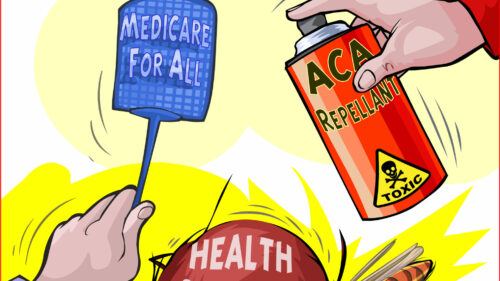What is the deadliest animal in the world? It isn’t sharks, lions, tigers, or bears (oh, my!), or even snakes or spiders. It is the lowly, blood-sucking mosquito. The Discovery Channel doesn’t feature an annual “Mosquito Week.” The world’s deadliest animal is boring, annoying, and seemingly everywhere.
Healthcare is our economy’s mosquito. It is sucking an excess amount of blood, or money, from our economy. It threatens the economic health of the federal government, businesses, and families. Therefore, I refer to our high-cost healthcare situation as our health “costquito.” Sure, it sounds like a lunch special at a Mexican restaurant, but the challenge and threat of the costquito is very real and very serious.
High Healthcare Cost in a Global Economy
The United States has the highest-cost healthcare system among all economically developed nations, according to the Organization for Economic Cooperation & Development (OECD). We spend 156 percent more per person than the OECD average.
Think of Gross Domestic Product (GDP) as the total pie of the American economy. Healthcare has consumed an ever-increasing share of the country’s total economic pie. This excess expenditure puts pressure on employers for goods and services trying to compete in a global marketplace. Think of everything produced in the U.S. as having an 8.4 percent healthcare tariff. A tariff is an additional cost added to a product or service. Any good or service produced in the U.S. effectively has an 8.4 percent healthcare tariff. Therefore, in other countries, the cost to produce a good or provide a service is lower because the healthcare cost burden is lower.
High Healthcare Cost as a Payroll Expense
Employers who offer health insurance coverage for their employees have seen the healthcare component of total compensation to employers steadily increase. Employers look to shift responsibility to employees, and these employee/voters are increasingly looking to the government to make some type of aggressive healthcare cost intervention.
- Shifting costs to the government by increasing public programs or subsidies doesn’t necessarily lower the total impact on the economy. It simply shifts it to increased taxes or an increasing deficit.
- Shifting costs to employers by mandating coverage or contribution levels also doesn’t lower the total impact on the economy. Employers look at total compensation, which includes the cost of health benefits. A dollar of increase in health benefit spending is a dollar that could’ve been used in increasing wages. Health benefits are consuming an increasing share of total compensation, thereby suppressing direct wage increases.
- Shifting costs to employees through increased per-paycheck contributions, higher deductibles, and out-of-pocket limits doesn’t lower the total impact on the economy. An increasing share of household disposable income is dedicated to healthcare expenditures.
High healthcare cost isn’t just a problem for the federal government. It isn’t just a problem for the large employers who are mandated to offer health insurance to their full-time employees. It isn’t just a problem for the middle-class family trying to make sure there isn’t too much month at the end of the money. High healthcare cost is a problem that threatens federal government resilience, large-employer competitiveness, and individual household solvency. Simply smashing the costquito in its economically bloated state creates a potential bloody mess. The right answer to our healthcare reform question is one that lowers the cost for everyone by systematically decreasing the flow of money over time.
With that said, tune in next week where we’ll take a look at just how complicated our healthcare system really is AND take a look at four common terms most Americans simply don’t understand but are faced with all the time. And, if you haven’t already, I encourage you to sign up for our “Insiders’ Club” where you’ll be notified when I release new information AND receive a FREE copy of my book “The Voter’s Guide to Healthcare: A non-partisan, candid, and relevant look at politics and healthcare in America” when it’s available.








